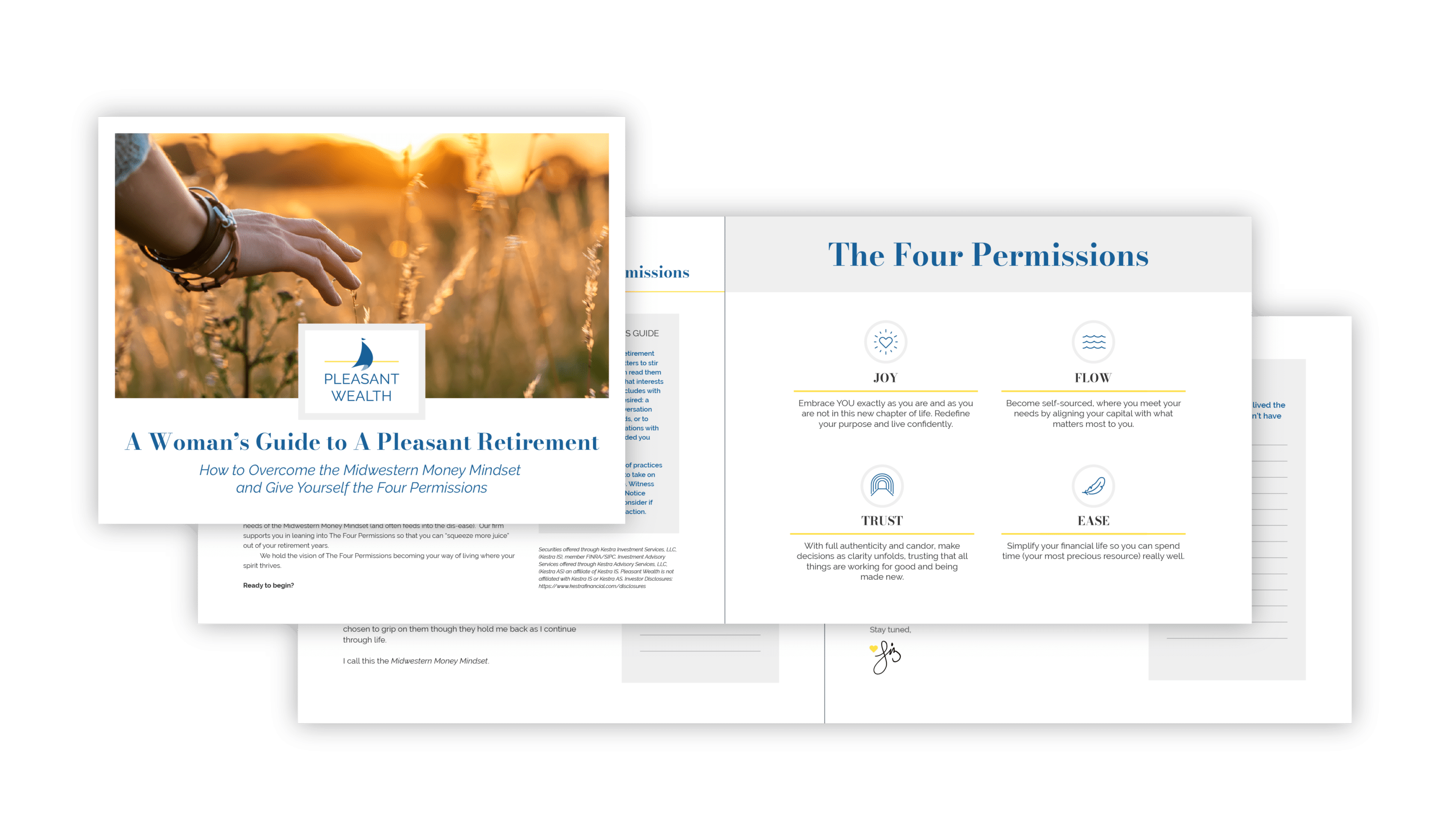Don’t go without downloading our free retirement guide!
A Woman’s Guide to a Pleasant Retirement
How to Overcome the Midwestern Money Mindset and Give Yourself the Four Permissions

Check the background of this firm on FINRA’s BrokerCheck →
Did you know the average age of widowhood in the US is 59?
That’s right. The loss of a spouse – an indescribable, disorienting loss- is likely to happen just as couples are beginning to plan their retirement.
Do you know what’s worse? Typically, women are already at a financial disadvantage at retirement. Their wages are often lower. Many women step out of the workforce to raise children, reducing savings and Social Security. Also, historically our culture favors men in financial matters- meaning women often aren’t coached to make their own money decisions.
At Pleasant Wealth, we work with women who are in the driver’s seat of their finances to help them make their best financial decisions. We’ve helped hundreds of people make the move from a career or business into new opportunities: exploring, living, and giving.
Let’s look at a real-life scenario where a Pleasant Wealth client thrived despite an unexpected solo retirement.
Susan and her husband Dillon started working with Pleasant Wealth in their late 50s. They had farmed for decades and owned a lawn care business. Dillon’s health was declining, and it was time to step back from farming. However, they wanted to keep the lawn care business & equipment, which employed their children. They also wanted to keep as much land as they could.
Their advisor walked them through the tax implications of selling each of their assets. He also showed them how much income the proceeds could generate. This made it easy for Susan and Dillon to decide which parcels to sell. They saw their new income picture clearly: rentals, investment income, and Social Security. With this clarity, they were able to exit farming with confidence.
Unfortunately, Dillon’s health continued to deteriorate, and his mental capacity diminished quickly. In the past, Susan and Dillon had made decisions together. She usually deferred to Dillon, letting him lead the conversation with their advisor. But now, she found herself in the driver’s seat.
Susan began driving the conversations. With her advisor, she decided to downsize their home and sell most of the lawn care equipment. She wanted to care for Dillon in her home as long as she could. Her advisor helped her see how long her resources would cover the costs of Dillon’s care.
When Dillon’s care became too much for Susan to manage on her own, she was able to make a confident decision to move Dillon into care. Instead of running herself ragged and worrying about money, Susan could focus on taking care of herself and spending her time with Dillon.
Over the next year, Susan had many conversations with her advisor. These were not just investment and tax conversations. Instead, they spent several sessions exploring how Susan’s situation was shifting. She realized that having a simple, low-cost lifestyle would let her prioritize the flexibility she really wanted. She downsized again to a small condo near Dillon and her grandchildren.
After being in Long-Term Care for about a year, Dillon passed away. Although this was a difficult time, Susan was prepared.
Throughout the last year of Dillon’s life, Susan identified some new priorities she hadn’t had room to consider before.
Susan’s situation is unique, but not uncommon. Retirement is a series of changes, not an event. Complicated decisions often come down to the next best step, and talking with a CERTIFIED FINANCIAL PLANNER™ professional who understands the financial and tax implications is invaluable. We know these types of conversations can be difficult, but as was the case with Susan, having them proactively can make a big difference.
If you have questions about the transitions you’re facing in retirement, reach out to us today.

Clinton Miller, CFP®, is an investment advisor & financial planner with an educational background in mathematics. He enjoys making tax planning relevant for clients so they can make confident money decisions.
He and his wife Aubrey are based in Canton, OH & have two sons. In his spare time, he enjoys fishing, chainsaw repair, & mucking around in the woods.